Wednesday, 4 August 2021
PRESIDENT STRESSES STRENGTHENING OF RELATIONS WITH GHANA
PRESIDENT SADDENED BY ADVISER'S DEATH
Afghanistan fighting traps terrified Lashkar Gah residents
“The Taliban will have no mercy on us and the government won’t stop the bombing.”
The resident of Lashkar Gah in southern Afghanistan is one of thousands trapped or fleeing for their lives as fighting for control of the city rages between militants and government forces.
The BBC is not naming some interviewees in this article for security reasons.
“There are corpses on the roads. We do not know if they are civilians or the Taliban,” the man told the BBC Afghan service in an interview on Whatsapp. “Dozens of families have fled their homes and settled near the Helmand river.”
Other terrified locals told the BBC they had seen bodies lying in the streets.
Capturing the Helmand provincial capital would be of huge symbolic value to the insurgents as they continue their rapid advance after the pullout of foreign forces. Helmand was the centrepiece of the US and British military campaign.
The United Nations and other agencies are warning of a worsening humanitarian crisis. At least 40 civilians have been killed in Lashkar Gah in the past day, the UN said on Tuesday.
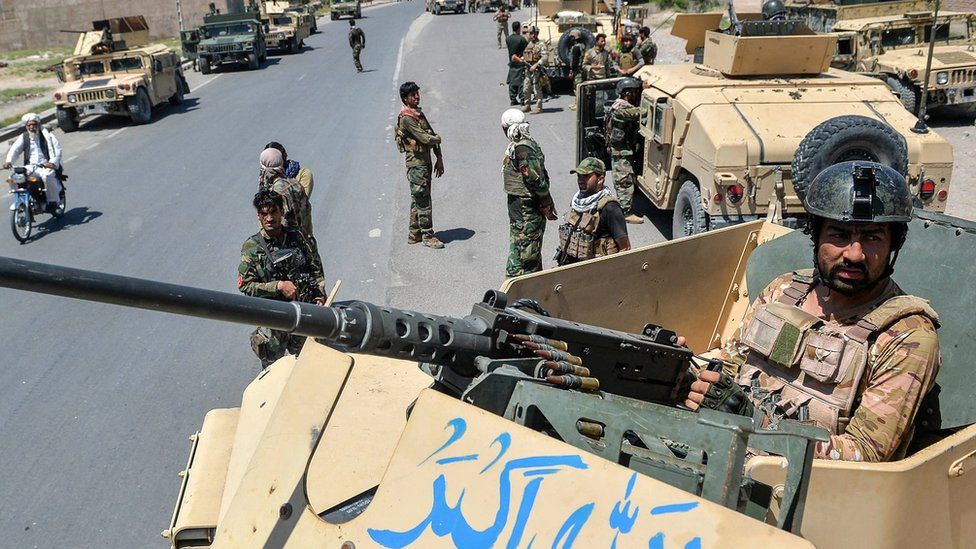
The Afghan army urged civilians to leave Lashkar Gah ahead of a major offensive against the Taliban, the hardline Islamist group that was driven from power by US-led forces 20 years ago.
Elsewhere in the south, Taliban are trying to capture Kandahar, their former stronghold, and clashes have also intensified in Herat in the west.
Fighting has been going in Lashkar Gah for days, with the militants now reportedly in control of most districts.
“We are going through difficult days,” a student in the city told the BBC. “The Taliban set fire to the ground and government air forces to the skies.”
Another man said on Sunday: “The Taliban can be seen on the city’s roads. The presence of the Taliban has astonished people here.
“Shops are closed, and government military vehicles are lying destroyed in the middle of the road. The war continues within a few metres of the governor’s office and the National Security Directorate.
“The central government said recently they had deployed new commandos to Lashkar Gah, but we didn’t see them.”
Hundreds of Afghan reinforcements have since reportedly been deployed to the city.
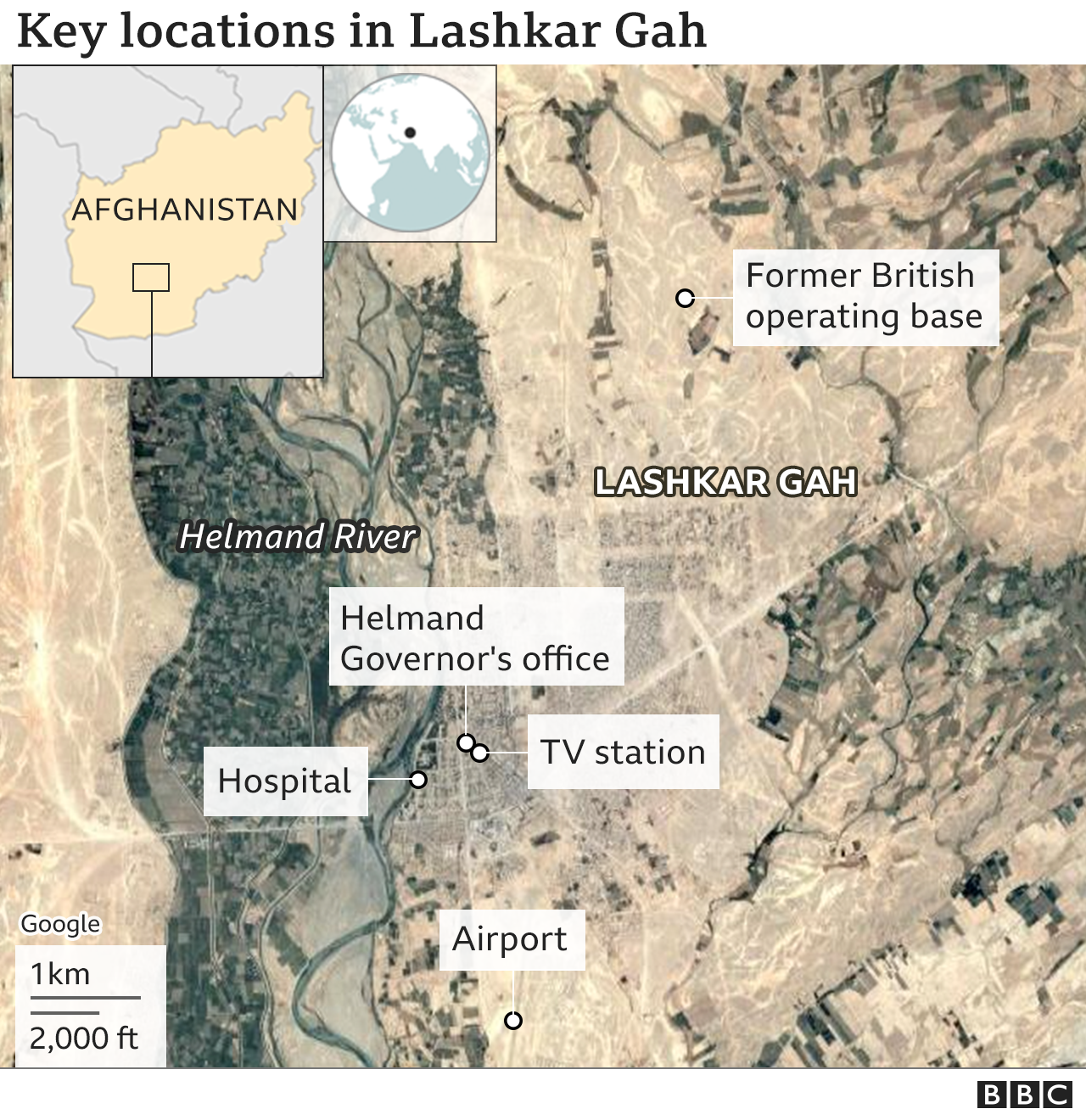
At the weekend, Attaullah Afghan, the head of Helmand provincial council, admitted that fighting seemed to be “getting out of our control”.
The Taliban appear to have made further advances this week, despite Afghan and US warplanes targeting the insurgents.
There are reports that Taliban fighters have taken positions inside homes, shops and the bazaar and that people in the city are trapped in their homes while fighting goes street to street.
The militants generally warn people via loudspeaker to leave but sometimes they enter houses – locals have just minutes to flee or risk being caught in crossfire as their homes become part of the battlefield.
“The Taliban told us if we didn’t leave the house in half an hour, we would be counted among the police and Afghan forces,” said the student the BBC Afghan service spoke to.
During their rule in the late 1990s, the Taliban publicly executed people and restricted women’s access to education and employment.
The Taliban say they have changed and would no longer resort to such violence – but many Afghans are sceptical.
Human Rights Watch has documented cases of reprisal attacks by the militants against civilians deemed to have supported the government.
The UN says civilians are bearing the brunt of the conflict and is urging all parties to do more to protect civilians or the impact will be catastrophic.
The thousands who’ve escaped the fighting now face a lack of food, drinking water and medicines.
A doctor in Lashkar Gah, Masood Khan, said an ever-increasing flow of severely wounded patients was arriving at his hospital, and he feared that others were unable to reach it. He said medical supplies were running low.
“We are receiving a lot of war wounded… There is fighting all around,” Dr Kahn, an intensive care specialist at a hospital run by the health charity MSF, told the BBC on Monday.
Videos of reported Taliban atrocities are being shared on social media, deepening fears of their possible return.
The United States and Britain say the group may have committed war crimes, accusing them of massacring dozens of civilians in revenge killings in Spin Boldak, on the border with Pakistan.
There are also reports that at least 40 Hazaras of the Shia Muslim minority were targeted and killed in Malistan in eastern Ghazni province.
The Taliban have dismissed the accusations as baseless, and are posting their own grisly images of civilian casualties in Afghan and US air strikes.
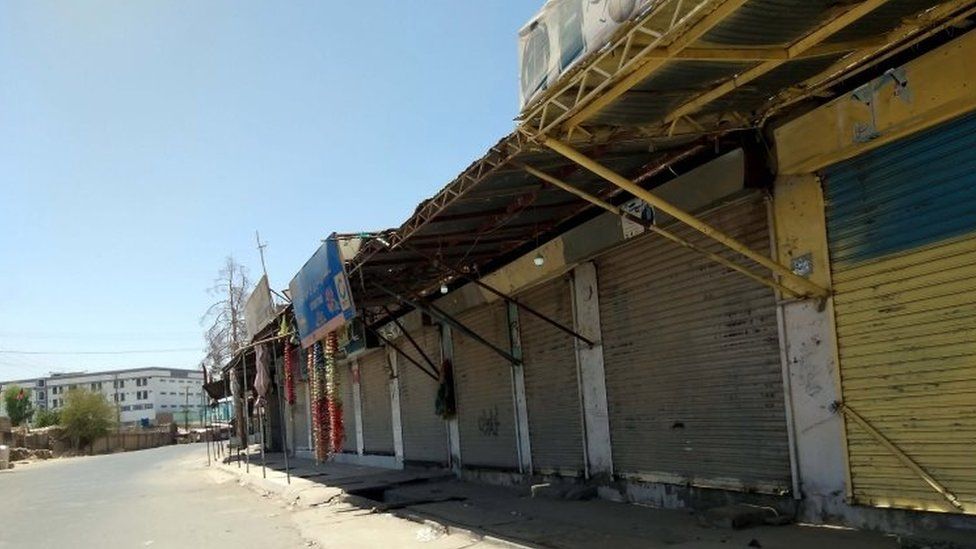
Those trapped in the worsening fighting have few options.
“We have neither bread nor water in the house, and the electricity is completely cut off,” a local businessman in Lashkar Gah told the BBC.
“I do not know where to go, there are clashes in every corner of the city.”
An Afghan interpreter living in the city said his life was under threat from the Taliban because he had worked for the British forces.
“I have changed address three times. My own house has been captured by the Taliban and they are living there and they were asking for me,” he said.
“We don’t know what will happen in the future but they are looking from house to house to find the people who worked for Nato.”
……………………………………………………
Tokyo Olympics: Nigeria and Ghana claim medals on day 11 in Tokyo
Day 11 of the Tokyo Olympics saw Nigeria win silver and bronze as Ghana also claimed a bronze in boxing.
Blessing Oborududu won silver in the women’s freestyle wrestling as her compatriot Ese Brume claimed bronze in the women’s long jump as they clinched Nigeria’s first medals in Tokyo.
Ugandans Joshua Cheptegei and Jacob Kiplimo both have the chance to win their second medals in Tokyo, to go with the ones they won in the men’s 10,000m, as they qualified for Friday’s final of the 5,000m.
Liberia’s American-born Joe Fahnbulleh beat world champion Noah Lyles and set a new national record as he reached Wednesday’s final of the men’s 200m.
Ghanaian boxer Samuel Takyi had to settle for a bronze medal as he lost his featherweight semi-final as he won his nation’s first Olympic medal since 1992 when the men’s football team also claimed a bronze.
Two Egyptian wrestlers will fight for bronze medals on Wednesday after losing their semi-final bouts on day 11.
More to details below and more to follow – BBC Sport Africa will be updating this page with highlights from African competitors on day 11 of the Tokyo Olympics.
Athletics afternoon session
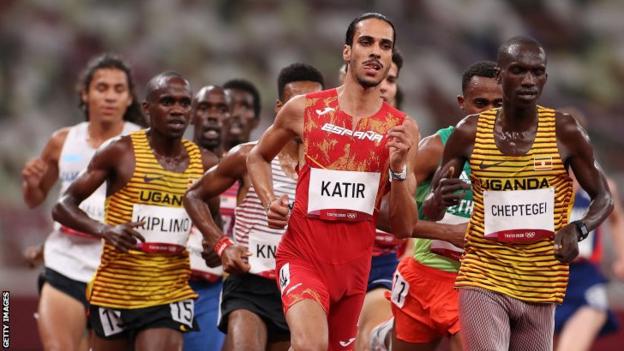
Uganda’s world record holder Joshua Cheptegei eased into the final of the men’s 5,000m as he aims for a second medal in Tokyo, having won silver in the men’s 10,000m on Friday.
His compatriot Jacob Kiplimo, the bronze medallist from the 10,000m, finished just ahead of Cheptegei as both progressed by finishing in the top five of the second heat.
Ethiopia’s Milkesa Mengesha was sixth in the same heat to clinch a place in the final as a fastest loser but Lesiba Mashele of South Africa was not quick enough to advance while Kenya’s Samwel Masai did not start.
The first heat was won by Kenya’s Nicholas Kipkorir Kimeli as he qualified automatically for the final, with Uganda’s Oscar Chelimo also progressing in fourth.
Getnet Wale of Ethiopia, who finished fourth in Monday’s men’s 3,000m steeplechase final, missed out on another final as he finished ninth.
Another Kenyan Daniel Simiu Ebenyo fell during the race but recovered to catch up with the leaders before fading away towards the end to finish 10th.
Morocco’s Soufiyan Bouqantar, Ethiopia’s Nibret Melak Bogale and Abidine Abidine of Mauritania all missed out as well.
Liberia’s American-born Joe Fahnbulleh set a new national record as he qualified automatically for Wednesday’s men’s 200m final.
The 19-year-old pipped the USA’s world champion Noah Lyles on the line for second place in a photo finish in their semi-final, both men given 19.99 seconds.
Nigeria Divine Oduduru managed third in the first semi-final just ahead of Ghana’s Joseph Amoah but neither men recorded times quick enough to progress as fastest losers.
South African trio Anaso Jobodwana, Clarence Munyai and Shaun Maswanganyi as well as Eswatini’s Sibusiso Matsenjwa all failed to progress.
None of the African competitors in the men’s 110m hurdles progressed from the heats with South Africa’s Antonio Alkana, Senegal’s Louis Francois Mendy, Jeremie Lararaudeuse of Mauritius and Fadane Hamadi of Comoros all missing out.
Athletics morning session
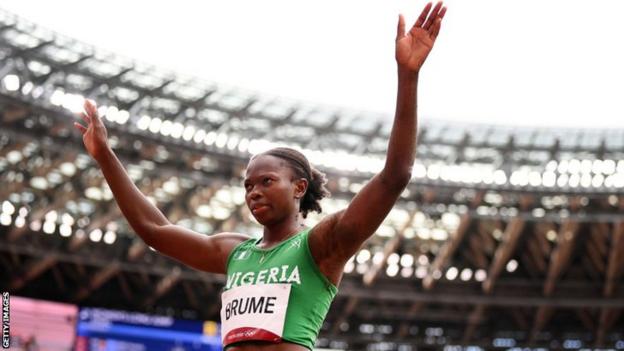
Nigeria’s Ese Brume, 25, won the country’s first athletics medal in Tokyo when she settled for bronze in the women’s long jump event.
Her best leap of 6.97m was just three centimetres behind winner and reigning world champion Malaika Mihambo of Germany, but 20cm short of the African record she set in May.
Brume’s mark was actually the same as Brittney Reese but the American clinched the silver medal because her second longest jump of 6.95m was further that the Nigerian’s next best leap.
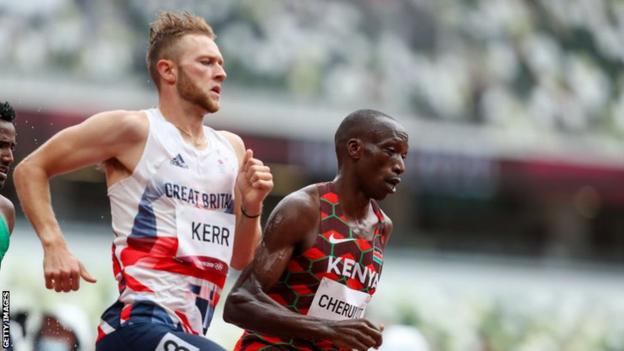
Kenya’s 1500m world champion Timothy Cheruiyot, his compatriots Abel Kipsang and Charles Simotwo all qualified from the heats for Thursday’s semi-finals.
The trio will be joined by Ethiopians Samuel Zeleke and Teddese Lemi, Morocco’s Abdelatif Sadiki as well as Djibouti’s Ayanleh Souleiman.
Ethiopia’s Samuel Tefera , South Sudan’s Abraham Geum, Somalia’s Ali Idow Hassan, Morocco’s Anass Essayi and Equatorial Guinea’s Benjamin Enzema all failed to progress.
There was also disappointment for Morocco’s 3,000m steeplechase gold medallist Soufiane EL Bakkali and Uganda’s Ronald Musagala who did not finish.
In the men’s 200m heats Eswatini’s Sibusiso Matsenjwa survived a warning to set a new national record 20.34 seconds to be the fastest African qualifier for the semi-finals, set for later on Tuesday.
Nigeria’s Divine Oduduru, Ghana’s Joseph Paul Amoah, Liberia’s Joseph Fahnbulleh as well as South Africans Anaso Jobodwana, Shaun Maswanganyi and Clarence Munyai also progressed.
However Mali’s Fode Sissoko, Cameroon’s Emmanuel Eseme and Zambia Sydney Siame all failed to make it to the semi-finals.
In the men’s triple jump, the second best performer this year, Burkina Faso’s Hugues Fabrice Zango managed to sneak into Thursday’s final with a jump of 16.83m.
It was short of the automatic qualifying distance of 17.05 but was enough for him to progress as one of the top 12 jumpers. Algeria’s Yasser Mohamed Triki did manage to hit 17.05m with his final jump to join Zango in the final.
The only African representative in the women’s javelin South African Jo-Ane Van Dyk could only manage a throw of 57.69m which was not enough for her to reach the final.
In the women’s 400m heats Botswana’s former world champion Amantle Montsho failed to finish her heat and will not race in Wednesday’s semi-finals and announced after the race she was retiring.
Her compatriots Galefele Moroko and Christine Botlogetswe as well as Kenya’s Helen Syombua Kalii, Uganda’s Leni Shida and Nigeria’s Patience George also failed to progress from the heats.
Wrestling
Nigeria’s Blessing Oborududu won silver as she lots to the USA’s Tamyra Marianna Stock Mensah in the final of the women’s 68 kg freestyle event to secure her nation’s first ever Olympic wrestling medal.
The 32-year-old lost 4-1 on points to the American in the bout.
Boxing
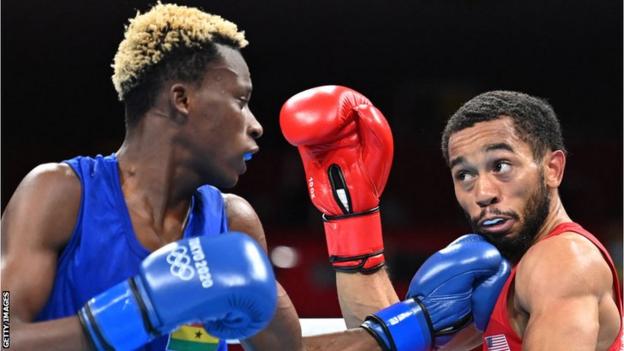
Ghana’s Samuel Takyi had to settle for a bronze medal in Tokyo as he lost his featherweight semi-final 4-1 on points to the USA’s Duke Ragan.
The 20-year-old’s medal is the first one for Ghana since the men’s football team won bronze at the 1992 Games in Barcelona.
Ghana’s other three Olympic medals have all come in boxing with Clement Quartey winning a silver in 1960, Eddie Blay and Prince Amartey claimed bronzes at the 1964 and 1972 Games respectively.
Takyi’s medal is the only one for Africa in boxing in Tokyo.
Algeria’s Imane Khalif missed out on at least a bronze as she lost 5-0 on points to Ireland’s Kellie Harrington the in the women’s lightweight quarter-finals.
Wrestling
Egypt’s Mohamed Ibrahim Elsayed faces a bout on Wednesday to win a bronze medal in the 67kg category of the men’s Greco-Roman wrestling. He lost narrowly on points to Ukraine’s Parviz Nasibov in Tuesday’s semi-finals.
He will face either Denmark’s Fredrik Holmquist Bjerrehuus or Artem Surkov from the Russian Olympic Committee for one of two bronze medals on offer in the wrestling events.
His compatriot Mohamed Moustafa Metwally also lost his semi-final in the 87 kg category on Tuesday as he was easily beaten by Hungary’s Viktor Lorincz.
He will now face either Germany’s Denis Maksymilian Kudla or Atabek Azizbekov of Kyrgyzstan on Wednesday in bout for a bronze medal.
……………………………………………
African-German Young Leaders Program 2021 for young emerging African Leaders.
AGYLE is an African-German Young Leaders program that brings young leaders from Africa and Germany together in a long-term business network. The direct encounter and cooperation between the participants is intended to strengthen the African-German dialogue and lay the foundation for a new economic cooperation.
AGYLE is a program of the Agency for Business and Development (AWE) and Germany - Land of Ideas; AWE is funded by the Federal Ministry for Economic Cooperation (BMZ) and supported by GIZ and DEG.
Requirements
You are a young manager up to the age of 40
from the fields of business, politics and media
from Germany, Ghana, Ethiopia or Rwanda
who has already taken on initial managerial responsibility in her job
who is socially committed in addition to her professional activity
who is interested in African-German topics
shows willingness to actively participate in the business network
Benefits
The opportunity to network intensively and to develop innovative business models and solutions. In addition, the selected executives are included in an exclusive business network so that they can stay in touch over the long term and sustainable business relationships develop beyond the program
A Royal Encounter at Madame Tussauds London - Part 7
Exploring the Majesty of the Palace and Its Distinguished Guests Greetings, ladies and gentlemen! My name is Sofonie Dala, and I am deligh...

-
Since the July 26 coup, Niger has become the latest hotbed of disinformation in the troubled Sahel region as West African powers grapple wit...
-
Angolan President of Republic João Lourenço marked Saturday (26) the third year of his five-year in office, marked by the strong negative ...
-
Celebrating Purpose, Passion & Powerful Public Engagements! Dear Changemakers, As we reach the midpoint of 2025, we’re thrilled to sha...





